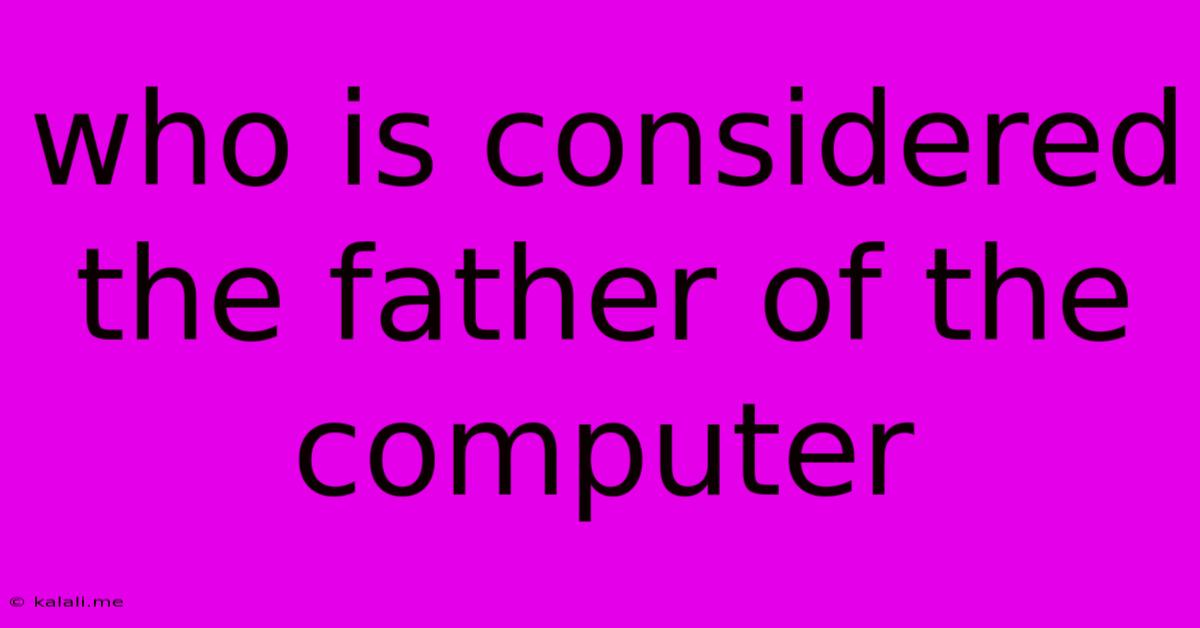Who Is Considered The Father Of The Computer
Kalali
Jun 14, 2025 · 3 min read

Table of Contents
Who is Considered the Father of the Computer? A Complex Question with No Single Answer
The question of who deserves the title "Father of the Computer" is surprisingly complex. There's no single inventor; rather, the computer as we know it is the culmination of centuries of mathematical and engineering advancements, built upon the contributions of numerous brilliant minds. While attributing paternity to one person is inaccurate, several individuals stand out as pivotal figures in the computer's development. This article explores their contributions and explains why pinpointing a single "father" is misleading.
Charles Babbage (1791-1871): The Visionary
Many consider Charles Babbage the "father of the computer" due to his conceptualization of the Analytical Engine in the 19th century. This mechanical general-purpose computer, though never fully built during his lifetime due to technological limitations, incorporated many features found in modern computers: a central processing unit (CPU), memory, input/output devices, and conditional branching. His work, particularly his collaboration with Ada Lovelace, laid the theoretical groundwork for future computing machines. Babbage's visionary ideas anticipated the core principles of modern computers by almost a century.
Ada Lovelace (1815-1852): The First Programmer
No discussion of computing pioneers is complete without Ada Lovelace, considered by many to be the first computer programmer. Her work on the Analytical Engine involved developing algorithms – sets of instructions – intended to be processed by the machine. Her notes on Babbage's machine contained what is recognized as the first published algorithm designed to be processed by a machine, cementing her place in computing history. Her contributions emphasize the importance of software alongside hardware in computer development.
Alan Turing (1912-1954): The Architect of the Modern Computer
Alan Turing's influence on computer science is undeniable. His groundbreaking work on the Turing machine, a theoretical model of computation, provided a formal framework for understanding algorithms and computation. His contributions during World War II, breaking the Enigma code using the Bombe machine, demonstrated the practical power of computation in solving complex problems. Turing's concepts laid the foundation for modern computer architecture and theoretical computer science, solidifying his position as a pivotal figure in the field.
John von Neumann (1903-1957): The Architect of the Von Neumann Architecture
John von Neumann's contributions are equally critical. His work on the von Neumann architecture, a computer design that uses a single memory space for both instructions and data, is the basis for almost all modern computers. This architecture revolutionized computer design, allowing for greater efficiency and flexibility. His involvement in the development of early electronic computers, like the EDVAC, cemented his legacy in computer history.
Conclusion: A Collaborative Effort
Attributing the title of "father of the computer" to a single individual overlooks the collaborative and iterative nature of technological advancement. Charles Babbage's visionary design, Ada Lovelace's programming insights, Alan Turing's theoretical breakthroughs, and John von Neumann's architectural innovations all represent crucial milestones in the development of the modern computer. The computer is the product of a rich history of contributions, a testament to the power of collective human ingenuity. Instead of searching for a single "father," it is more accurate to celebrate the many individuals who shaped the evolution of this transformative technology.
Latest Posts
Latest Posts
-
14 Principles Of Scientific Management By Frederick Taylor
Jun 14, 2025
-
Ultimate Tensile Strength Of Cast Iron
Jun 14, 2025
-
What Is Scientific Name Of Snake
Jun 14, 2025
-
Ringers Solution Contains Which Of The Following
Jun 14, 2025
-
What Is The Prime Factorization Of 93
Jun 14, 2025
Related Post
Thank you for visiting our website which covers about Who Is Considered The Father Of The Computer . We hope the information provided has been useful to you. Feel free to contact us if you have any questions or need further assistance. See you next time and don't miss to bookmark.